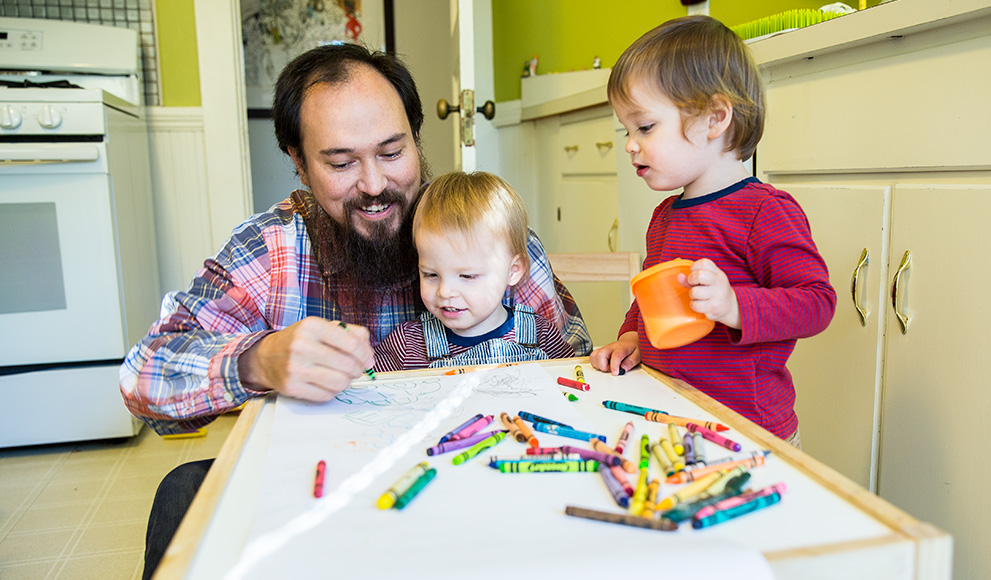Some Faculty Members Draw Professional Inspiration From Their Children Or Their Own Childhoods

Some Wellesley faculty members find inspiration for their work and teaching in their own families. That’s certainly true for David Teng-Olsen, Susan Meyer, and Dan Chiasson.
David Teng-Olsen, assistant professor of art, has always drawn on his own childhood to explore issues related to identity in his abstract art. Olsen, who is Chinese-American by birth, was raised by his adoptive American father, an artist who believed in living and working without boundaries. Olsen uses bold, childlike colors in his pieces that raise a central question—is nature or nurture more important to a child’s identity?
Since the birth of his twin sons 22 months ago, Olsen said he has witnessed how fluid and surprising the answer to that question can be. “I’m excited to see what they want to do and how they are as little people,” he said. “One son carries a green car with him all day, which reminds me of my father, a quintessential American dreamer who loved cars, a real gearhead.”
The boys have also prompted Olsen to think about a child’s perspective when he paints a mural or large-scale piece. Sometimes that means forcing adults to look at a work from the height of a small child. More often, he simply wants “to remind people of their own childhoods.” he said. “That’s the universal part of it.”
Olsen’s last featured piece at the Davis Museum was a van he painted in the town of Wellesley during the summer of 2014. People watched or took pictures as he painted bright blocks of color, meant to suggest the controlling influences everyone has in life.
That project exemplifies how parenthood has reinvigorated Olsen’s artwork and his belief that all children—and all of his students—deserve unwavering support as they reach their full potential.
“As a teacher, I learn as much from my students as they learn from me,” he said. “I want to inspire them by not having any boundaries in the classroom, no constraints. I want students to be surprised by what they come up with.”
Susan Meyer, professor of English, has published literary criticism, a children’s book, and the young adult novel Black Radishes, which won the Sydney Taylor silver medal. Earlier this year, Meyer published a second picture book, New Shoes, whose young protagonist faces discrimination when she wants to try on shoes in the Jim Crow 1950s. That book was just named an NCTE Charlotte Huck Honor Book for Outstanding Fiction for Children.
The impetus to write about the African-American experience came when Meyer’s now-teenage daughter was in kindergarten. Meyer volunteered in the class every Friday and brought in picture books to read to the children. For February, Black History Month, Meyer wanted to read stories with black protagonists but, she said, she had a hard time finding enough to read.
Meyer asked her colleague Margaret Cezair-Thompson, senior lecturer in English, whose interests include African and Caribbean literature as well as creative writing, what books she could recommend. As a scholar, Meyer has long been interested in the relationship between literature and history. The inspiration for New Shoes came when she first read that black people weren’t allowed to try on shoes or clothes or hats in the Jim Crow era.
Cezair-Thompson, who had a 4-year-old son at the time, suggested some good titles, Meyer said, “but still, even now, there definitely aren’t enough good picture books with black protagonists.”
Dan Chiasson, associate professor of English and the poetry critic for The New Yorker, named his third book of poems, Where’s the Moon, There’s the Moon, after a game he used to play with his two sons. He told the Wellesley magazine that he “stole the structure from Sylvester and the Magic Pebble,” one of their favorite stories.
Chiasson’s fifth and newest book, Bicentennial, explores his childhood and the experience of growing up without a father—a familiar theme in his poetry. The collection of poems, which earned rave reviews from the Boston Globe and Publisher’s Weekly, also explores his role as a father and his desire to give his sons a stable, happy childhood.
In the title poem, Chiasson writes movingly about a question he frequently asks his sons: How do you feel your childhood is going? “The boys don’t like that poem,” he told the magazine with a laugh. “They say I only asked the question twice.”
Chiasson’s next project is a children’s book called The Moonkeeper’s Son.
